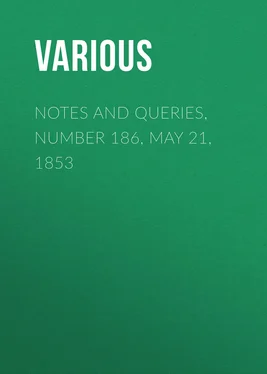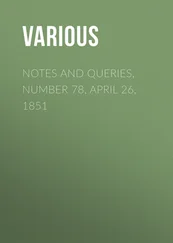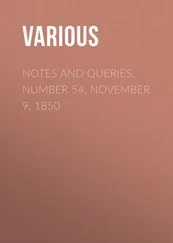Various - Notes and Queries, Number 186, May 21, 1853
Здесь есть возможность читать онлайн «Various - Notes and Queries, Number 186, May 21, 1853» — ознакомительный отрывок электронной книги совершенно бесплатно, а после прочтения отрывка купить полную версию. В некоторых случаях можно слушать аудио, скачать через торрент в формате fb2 и присутствует краткое содержание. Жанр: foreign_antique, periodic, foreign_edu, на английском языке. Описание произведения, (предисловие) а так же отзывы посетителей доступны на портале библиотеки ЛибКат.
- Название:Notes and Queries, Number 186, May 21, 1853
- Автор:
- Жанр:
- Год:неизвестен
- ISBN:нет данных
- Рейтинг книги:4 / 5. Голосов: 1
-
Избранное:Добавить в избранное
- Отзывы:
-
Ваша оценка:
- 80
- 1
- 2
- 3
- 4
- 5
Notes and Queries, Number 186, May 21, 1853: краткое содержание, описание и аннотация
Предлагаем к чтению аннотацию, описание, краткое содержание или предисловие (зависит от того, что написал сам автор книги «Notes and Queries, Number 186, May 21, 1853»). Если вы не нашли необходимую информацию о книге — напишите в комментариях, мы постараемся отыскать её.
Notes and Queries, Number 186, May 21, 1853 — читать онлайн ознакомительный отрывок
Ниже представлен текст книги, разбитый по страницам. Система сохранения места последней прочитанной страницы, позволяет с удобством читать онлайн бесплатно книгу «Notes and Queries, Number 186, May 21, 1853», без необходимости каждый раз заново искать на чём Вы остановились. Поставьте закладку, и сможете в любой момент перейти на страницу, на которой закончили чтение.
Интервал:
Закладка:
Various
Notes and Queries, Number 186, May 21, 1853 / A Medium of Inter-communication for Literary Men, Artists, Antiquaries, Genealogists, etc
NOTES
LORD BACON'S "ADVANCEMENT OF LEARNING."
Considering the large number of quotations from previous writers which occur in Lord Bacon's works, and especially in his most popular and generally read works—his Essays and his Advancement of Learning —it is remarkable how little his editors have done for the illustration of his text in this respect. The French editors of Montaigne's Essays , who is likewise a writer abounding in quotations, have bestowed much care on this portion of their author's text. The defect in question has, however, been to a great extent supplied in a recent edition of the Advancement of Learning , published by Mr. Parker in West Strand; and it is to be hoped that the beginning, so usefully made, may be followed up by similar editions of other of Bacon's works.
The edition in question, though it traces the great majority of Bacon's quotations, has left some gleanings to its successors; and I propose now to call attention to a few passages of the Advancement of Learning which, after the labours of the late editor, seem still to require further elucidation. My references are to the pages of the new edition:—
P. 25. "Then grew the flowing and watery vein of Osorius the Portugal bishop to be in price."
The editor prints Orosius for Osorius , and adds this note:
"All the editions have Osorius , which, however, must be a mere misprint. He was not a Portuguese, but a Spaniard, born at Tarragona, nor indeed ever a bishop. He was sent by St. Augustine on a mission to Jerusalem, and is supposed to have died in Africa in the earlier part of the fifth century."
The text of Bacon is quite right. The allusion is not to Paulus Orosius, a Spaniard, who flourished at the beginning of the fifth century; but to Jerome Osorio, who was born at Lisbon in 1506, afterwards became Bishop of Silves, and died in 1580. His works were published at Rome in 1592, in 4 vols. folio. His principal work, De rebus Emanuelis Virtute et Auspicio gestis , which first appeared in 1571, was several times reprinted, and was translated into French and English.
P. 31. "Time, which is the author of authors."
In Nov. Org. , i. 84., Time is called "Auctor auctorum, atque adeo omnis auctoritatis."
P. 34. "But of these conceits Aristotle speaketh seriously and wisely, when he saith, 'Qui respiciunt ad pauca de facili pronunciant."
The editor does not attempt to trace this passage. Query, If it is not in Aristotle, where is it to be found?
P. 60. "Ulysses, 'Qui vetulam prætulit immortalitati' is a figure of those which prefer custom and habit before all excellency."
The editor refers to Cic. de Orat. , i. 44., where it is said that such is the love of country,
"Ut Ithacam illam, in asperrimis saxulis, tanquam nidulum, affixam, sapientissimus vir immortalitati anteponeret."
Another application of the saying is made by Bacon in his Essay VIII., "On Marriage and Single Life:"
"Grave natures, led by custom, and therefore constant, are commonly loving husbands, as was said of Ulysses, 'vetulam suam prætulit immortalitati.'"
The passage in Cicero does not agree with the dictum quoted by Bacon, which seems to be a reference to the Odyssey , v. 136. 208-10.
P. 62. "Claudus in vià antevertit cursorem extra viam."
The same proverb is quoted in Nov. Org. , i. 61.
P. 85. "Omnia mutantur, nil interit"—
from Ovid, Met. , xv. 165.
Several passages are cited by Bacon from Seneca, which the editor does not trace. Thus, in p. 146., it is said,—
"Nocet illis eloquentia, quibus non rerum cupiditatem facit, sed sui."
Page 147.,—
"Vere magnum habere fragilitatem hominis, securitatem Dei."
The same passage is also quoted by Bacon in Essay V., "On Adversity," and in the treatise De Sap. Vet. , vol. x. p. 343., edit. Montagu.
Again, p. 159.:
"De partibus vitæ quisque deliberat, de summâ nemo."
Page 152.,—
"Cogita quamdiu eadem feceris," &c.,
repeated in part in the "Essay on Death."
This last passage is taken, with considerable verbal variations, from Epist. 77. § 6.
"Therefore Aristotle, when he thinks to tax Democritus, doth in truth commend him, where he saith, If we shall indeed dispute, and not follow after similitudes ," &c.
The passage referred to is in Eth. Nic. , vi. 3.; but it contains no allusion to Democritus, who is not even named in the Ethics ; and the word which Bacon renders dispute (ἀκριβολογεῖσθαι) means to speak with precision .
P. 163. "For as the ancient politiques in popular states were wont to compare the people to the sea, and the orators to the winds."
The allusion is to a couplet of Solon:
"ἐξ ἀνεμων δὲ θάλασσα ταράσσεται· ἢν δέ τις αὐτὴν
μὴ κινῇ, πάντων ἐστι δικαιοτάτη."
And to a passage of Livy (xxviii. 27.):
"Multitudo omnis, sicut natura maris, per se immobilis est, venti et auræ cient."
Compare Babrius, fab. 71.
P. 165. "Did not one of the Fathers, in great indignation, call poesy vinum dæmonum ?"
The same citation recurs in Essay I., "On Truth:"
"One of the Fathers, in great severity, called poesy vinum dæmonum ."
Query, Who is the Father alluded to?
Page 177., the sayings, "Faber quisque fortunæ propriæ" is cited; and again, p. 178., "Faber quisque fortunæ suæ." In Essay XL., "On Fortune," it is quoted, with the addition, "saith the poet." The words are to be found in Sallust, Ad Cæsar. de Rep. Ord. , ii. 1.:
"Sed res docuit, id verum esse, quad in carminibus Appius ait, fabrum suæ esse quemque fortunæ."
The Appius alluded to is Appius Claudius the Censor.
Bacon proceeds to say:
"This conceit or position [viz. 'Faber quisque,' &c.], if it be too much declared and professed, hath been thought a thing impolitic and unlucky, as was observed in Timotheus the Athenian, who, having done many great services to the estate in his government, and giving an account thereof to the people, as the manner was, did conclude every particular with this clause, 'And in this Fortune had no part.' And it came so to pass, that he never prospered in anything he took in hand afterwards."
The anecdote is as follows:—Timotheus had been ridiculed by the comic poets, on account of the small share which his own management had had in his successes. A satirical painting had likewise been made, in which he was represented sleeping, while Fortune stood over him, and drew the cities into his net. (See Plutarch, Reg. et Imp. Apophth. , vol. ii. p. 42., ed. Tauchnitz; Ælian, V. H. xiii. 42.) On one occasion, however, having returned from a successful expedition, he remarked to the Athenians, in allusion to the previous sarcasms, that in this campaign at least Fortune had no share. Plutarch, who relates the latter anecdote in his Life of Sylla , c. 6., proceeds to say, that this boast gave so much offence to the deity, that he never afterwards prospered in any of his enterprises. His reverse of luck, in consequence of his vainglorious language against Fortune, is also alluded to by Dio Chrysost. Orat. , lxiv. § 19., edit. Emper. It will be observed that Plutarch refers the saying of Timotheus to a single expedition; whereas Bacon multiplies it, by extending it over a series of acts.
Читать дальшеИнтервал:
Закладка:
Похожие книги на «Notes and Queries, Number 186, May 21, 1853»
Представляем Вашему вниманию похожие книги на «Notes and Queries, Number 186, May 21, 1853» списком для выбора. Мы отобрали схожую по названию и смыслу литературу в надежде предоставить читателям больше вариантов отыскать новые, интересные, ещё непрочитанные произведения.
Обсуждение, отзывы о книге «Notes and Queries, Number 186, May 21, 1853» и просто собственные мнения читателей. Оставьте ваши комментарии, напишите, что Вы думаете о произведении, его смысле или главных героях. Укажите что конкретно понравилось, а что нет, и почему Вы так считаете.












